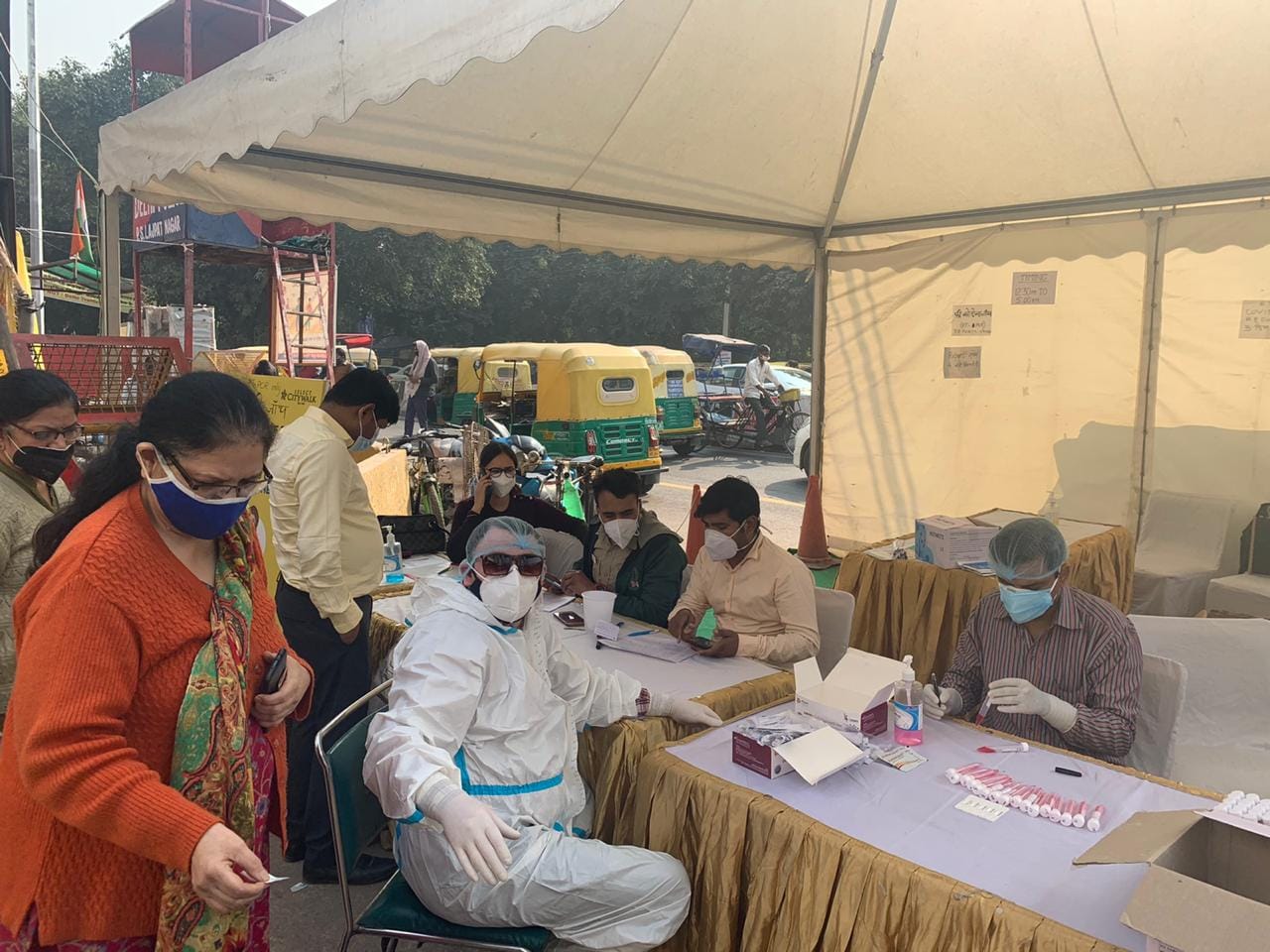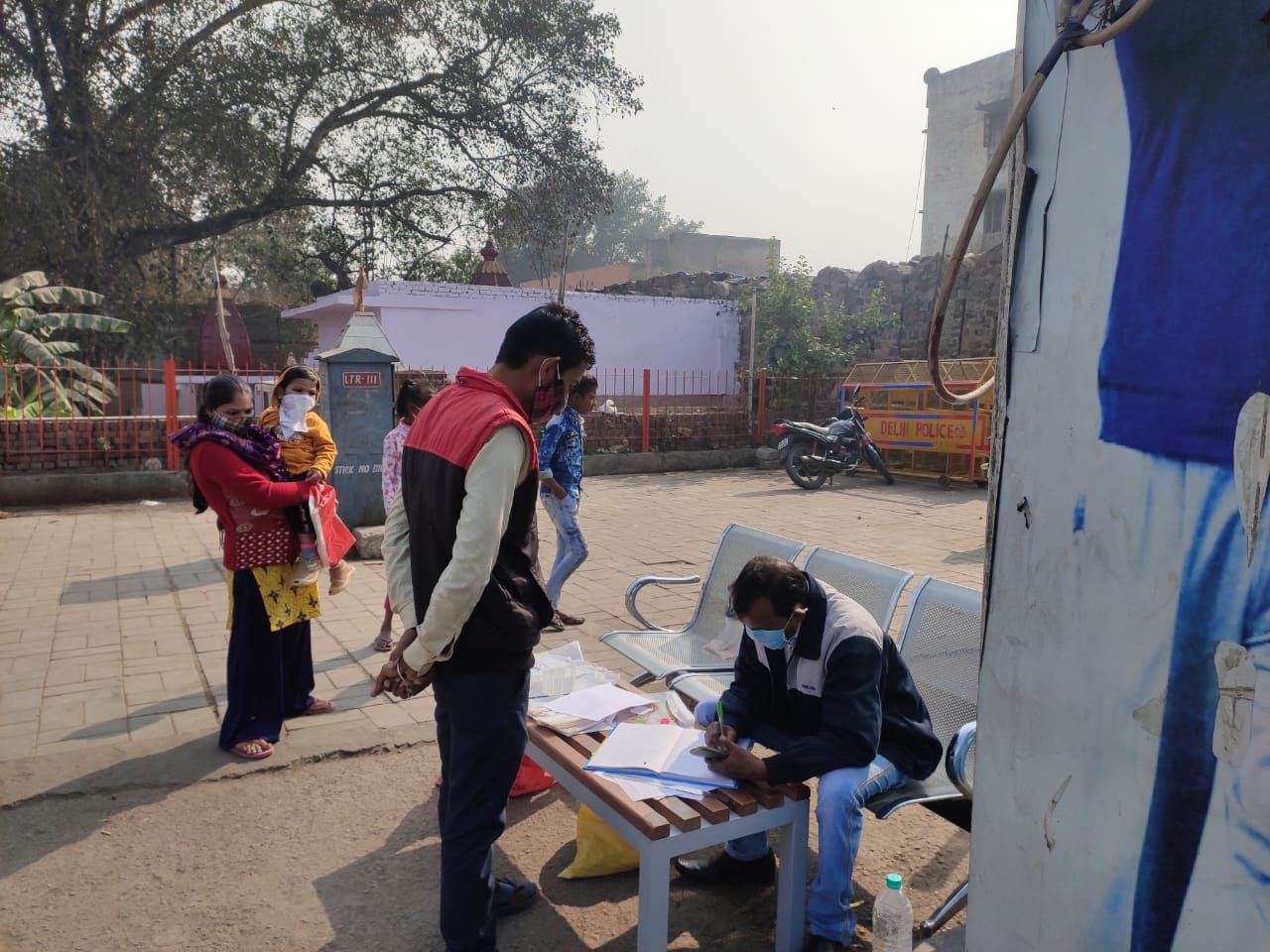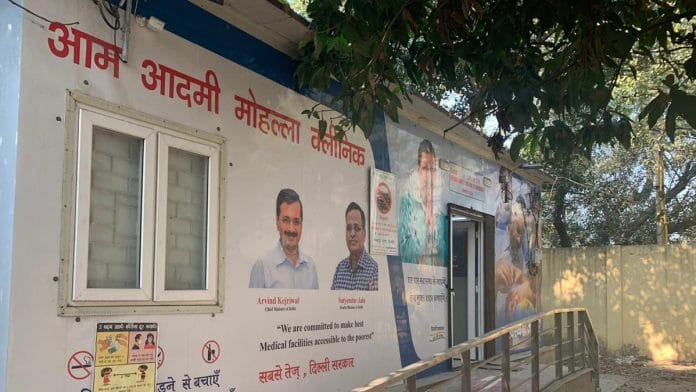New Delhi: Doctors working at Delhi’s mohalla clinics, set up by the ruling Aam Aadmi Party (AAP), are anxious. On Wednesday, a doctor at Gandhi Park mohalla clinic died of Covid-19, the third such death since the beginning of the pandemic.
Dr Indra Manocha, who was in her mid-60s, had tested positive on 11 November. She was in home isolation until 20 November, but then her oxygen saturation levels dropped and condition deteriorated. She was admitted to Ganga Ram Hospital, where she specialised as a gynaecologist before she started treating patients at mohalla clinics in September 2019.
On learning about Dr Manocha’s death, several mohalla clinic doctors asked the chief district medical officer to allow telemedicine services to ensure safety of doctors. To this, the nodal officer of AAP mohalla clinics, Shalley Kamra, said she would communicate their concerns to the Delhi health minister and revert. Kamra had responded on a WhatsApp group of mohalla clinic doctors, which ThePrint has seen.
As frontline workers in this pandemic, doctors and technicians at mohalla clinics often work in high-risk environments — with symptomatic patients who don’t wear masks and with inadequate gear. Their worries are further compounded by the fact that they aren’t covered by any Covid insurance, they said.
Those that ThePrint spoke to said they are unaware if they are eligible for the Covid insurance announced by the central government.
“It’s a risk. To my knowledge, there is no scheme for us. Nothing has been communicated to us on paper,” said a doctor from a clinic in Kamala Nagar, who did not wish to be named.
The Print reached Dr Nutan Mundeja, director general health services, Delhi, through calls and messages but didn’t receive a response till the time of publishing this report.

Doctors told ThePrint that several doctors and employees at clinics have tested positive over the past few months, though, a cumulative figure isn’t available.
“About 25 doctors deployed at the primary health clinics have already been infected with coronavirus,” said a doctor at one of the mohalla clinics in South Delhi, requesting anonymity. Kamra, however, told ThePrint, that she did not know the total number of mohalla clinic doctors who had been infected.
Apart from logistical issues, doctors have also been working without salaries for several months. Sources in Delhi government told ThePrint that doctors had threatened to go on strike if salaries pending since August were not paid this week.
Incidentally, on Wednesday, the same day Dr Manocha died, staff received salaries for August, September and October.
Also read: Delhi Mohalla Clinics battle mask shortage, delayed salary but continue quiet fight in pandemic
Mohalla doctors ‘unaware of insurance’
Mohalla clinic doctors are empanelled on a contractual basis, which is up for renewal every year. Once empanelled, doctors are paid per consultation. There are currently 189 functional clinics across the city.
Under normal circumstances, the terms and conditions of mohalla clinic doctors makes no mention of health insurance. But since the coronavirus pandemic broke out, doctors have expressed concern considering they are among frontline workers and hence have high exposure to the contagious virus.
In March this year, the Central government announced that all healthcare workers at risk of contracting Covid could apply for insurance under the Pradhan Mantri Garib Kalyan Package. Under the scheme, claimants can receive up to Rs 50 lakh in case of death.
But several mohalla clinic doctors ThePrint spoke to said insurance provisions were not communicated to them.
“When the pandemic first broke out, they said doctors with co-morbidities and those above 60 years could keep their clinics closed and opt for telemedicine instead. But we haven’t been informed of any insurance as such,” said a doctor from Kardampuri, in Delhi’s North East district.
Dr V.K. Gupta, a doctor at the Lajpat Nagar clinic, said, “Are mohalla clinic doctors any different from the ones at RML or AIIMS for that matter? Why this separate treatment for us?”
He further said staff and doctors at mohalla clinics were actually the first line of treatment since multiple symptomatic Covid-19 patients come to them first for a check-up. “There is no insurance or terminal benefit if anything happens to either the doctors or staff,” he said.
Dr Kamra, nodal officer of mohalla clinics, told ThePrint, “So far no one has been given insurance under the PM scheme. The DGHS (Directorate General of Health Services) is handling it, and we will send them files for approval.”
A lab technician at the CR Park mohalla clinic, requesting anonymity, said, “Since anyone can walk into our clinics, so many people from the lower strata of the society enter without masks.” She added that besides treating people for their illnesses, the clinics have been distributing masks as well. “But that doesn’t mean we can’t get infected. We’re actually more at risk, so there should be some incentive at least,” the technician said.
Also read: Govt says 64 families of doctors who died of Covid received Rs 50 lakh insurance
Testing ramped up
Meanwhile, mohalla clinics have also double up as Covid-19 testing centres. This was done after the Delhi government was repeatedly reprimanded by the high court for not conducting enough tests. The DGHS collects samples for RT-PCR tests outside certain clinics, while others conduct rapid antigen tests.
At Kashmere Gate, part of Delhi’s Central district, RT-PCR tests are conducted outside a clinic near the Hanuman Mandir. Two lab technicians, one from a private company and the other from a government lab, have a target of 100 tests a day, but that number has to be drummed up despite a high footfall.
“We’re located in a place where it’s hardly crowded, so not many people come. Otherwise we have to persuade people to get tested; they feel scared,” Prem Singh, the government lab technician, told ThePrint. “We’re able to do about 50 a day. Getting people to come forward is tough.”

In Kardampuri, staff from a mohalla clinic conduct RAT tests for an average of 15 people a day.
“Out of the tests we do, zero to one will turn out positive in a day. Most of these cases are asymptomatic. If we want to refer someone further, we tell them to go to the nearest dispensary for RT-PCR testing,” said the doctor of the clinic.
Antigen tests are lower in sensitivity, and hence are likely to produce more false negatives. The RT-PCR test, results of which take a minimum of a day, is considered the gold standard for Covid-19 testing.
At the mohalla clinic in Panchsheel Enclave, at least 15 of the 75 people who would come for testing until a month ago, would test positive. However, two to three people on an average have been testing positive out of the 35 who come to the clinic to get tested nowadays.
“People prefer getting an RT-PCR test done now ever since the government has encouraged more RT-PCR tests at government centres too,” said Dr Vandana, the doctor deployed at the clinic since the past year and a half. The clinic was made a testing centre for Covid in the third week of September.
Also read: Delhi govt is testing-tracing, but Covid third wave means people have to be responsible too






